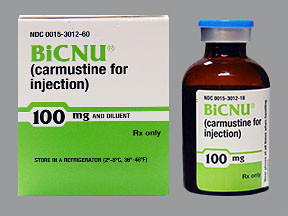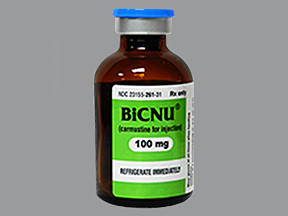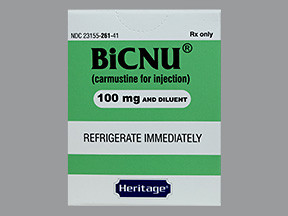CARMUSTINE - INJECTION
PHONETIC PRONUNCIATION: (kar-MUS-teen)
COMMON BRAND NAME(S): BiCNU
GENERIC NAME(S): carmustine
Uses
USES: This medication is used to treat certain types of cancer (including multiple myeloma, brain tumor, Hodgkin's disease, non-Hodgkin's lymphoma). Carmustine belongs to a class of drugs known as alkylating agents. It works by slowing or stopping the growth of cancer cells.
How to use CARMUSTINE - INJECTION
HOW TO USE: This medication is given by slow injection into a vein by a health care professional. It is given as directed by your doctor, usually every 6 weeks. The dosage is based on your medical condition, body size, and response to treatment.
Side Effects
Precautions
Interactions
Overdose
Images
Reviews
Faq for CARMUSTINE - INJECTION
Carmustine injection is used to treat certain types of cancer, including brain tumors, multiple myeloma, and Hodgkin's disease.
Carmustine injection is given by a healthcare professional as a slow infusion into a vein over several hours. The dosage and frequency of administration will depend on the specific condition being treated.
Common side effects of Carmustine injection may include nausea, vomiting, loss of appetite, rashes, and low blood cell counts. Serious side effects can include lung problems, liver damage, kidney problems, and allergic reactions.
It is important to follow your healthcare provider's instructions regarding diet, hydration, and rest while receiving Carmustine injection. You may also be advised to take certain vitamin supplements or medications to manage side effects.
Carmustine injection may interact with certain medications, herbal products, or supplements. It is important to inform your healthcare provider about all the medications you are taking before starting treatment with Carmustine injection.
Carmustine injection may cause severe blood cell suppression and increase the risk of infection and bleeding. It is important to have regular blood tests and follow up with your healthcare provider during treatment.
Carmustine injection may harm the unborn baby and should not be used during pregnancy. It is also not recommended for use while breastfeeding, as it may pass into breast milk and harm the nursing infant.
Carmustine injection should be stored in a refrigerator, away from light and moisture. It should not be frozen. Always check the expiration date and discard any unused medication properly.
Since Carmustine injection is usually administered under medical supervision, it is unlikely to miss a dose. However, if you think you have missed a dose, contact your healthcare provider immediately for further instructions.
Warning
WARNING: Carmustine may cause serious bleeding/blood problems. This effect can cause anemia, lower your body's ability to fight an infection, or cause your body to bruise or bleed more easily. Your doctor will check you closely during and for at least 6 weeks after treatment to lessen the chance of serious side effects. Tell your doctor right away if you develop symptoms such as easy bruising/bleeding, unusual tiredness, signs of infection (such as sore throat that doesn't go away, fever, chills). This medication may also cause very serious (possibly fatal) lung problems. The risk increases after receiving higher total doses and can occur years after treatment. Tell your doctor right away if you develop symptoms such as cough that doesn't go away, shortness of breath, chest pain, unusual weakness/tiredness.
Disclaimer
IMPORTANT: HOW TO USE THIS INFORMATION: This is a summary and does NOT have all possible information about this product. This information does not assure that this product is safe, effective, or appropriate for you. This information is not individual medical advice and does not substitute for the advice of your health care professional. Always ask your health care professional for complete information about this product and your specific health needs.




No Reviews Yet